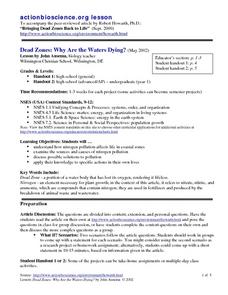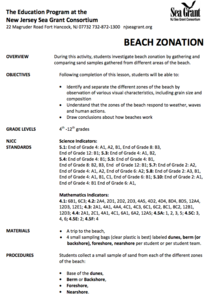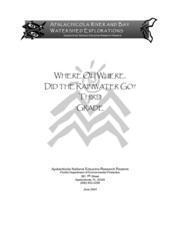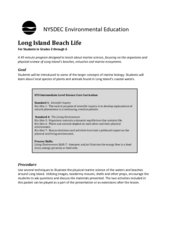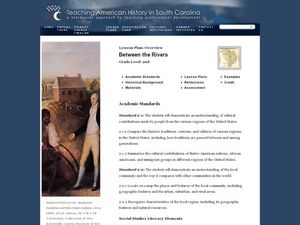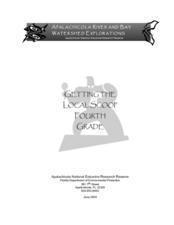Curated OER
Dead Zones: Why Are the Waters Dying?
Students investigate the effects of pollution on marine ecosystems. They read and discuss an article, identify the effects of pollution on marine life, conduct research on local nutrient pollution, and conduct local water quality studies.
Curated OER
The Intertidal Zone
Students research the diverse animal and plant life that inhabit the intertidal zones along the Pacific rocky coast. As students progress through this lesson plan, they begin to recognize distinct behaviors, adaptations, and...
Curated OER
Life In the Flood Zone
Students discover how floods occur by visiting the Weather Channel's website. They examine the areas of the United States which are more vulnerable for flooding. They research the history of previous floods and how to protect themselves.
Curated OER
Coastal Biodiversity of South Africa
Students investigate the biodiversity found along the coast of South Africa. They conduct research using a variety of resources. They use the information in order to write lab reports with the data. The lesson can be adapted to other...
Curated OER
The Dead Zone: A Marine Horror Story
Students graph dissolved oxygen versus depth using data taken from NECOP Program. In this marine science lesson, students explain the causes of hypoxia. They recommend possible solutions to this problem.
Curated OER
Beach Zonation
Students identify and separate the different zones of the beach by observation. They investigate beach zonation by gathering and comparing sand samples gathered from different areas of the beach.
Curated OER
Beach Zonation
Young scholars investigate the characteristics of the beach environment and explore beach zonation. After gathering samples from different areas of the beach, learners discuss how the beaches work and the characteristic of each zone....
Curated OER
Mapping The Ocean Floor
Young scholars explore and analyze the bottom structure of underwater habitats. They describe and explain what can't see through the collection and correlation of accurate data. Learners assess that technology is utilized as a tool for...
Curated OER
Aldridge Sawmill -- The Story in Numbers
Seventh graders view a recent transparency of the average rainfall zones of the state of Texas. Using another transparency, they identify the Piney Woods subregion of the Gulf Coastal Plain and locate national forests and sawmills. ...
Curated OER
Turning the Tide on Trash: Marine Debris Curriculum
Seven pages of fascinating reading on marine debris preface the activities in this lesson plan. Four different activities are employed to simulate how the debris is distributed in the ocean and along beaches. Early ecology learners...
Curated OER
Tides - The Ins and Outs of Tides
Get your junior oceanographers to generate tidal prediction graphs on an interactive website. They will feel like experts in the field, or shall we say, experts in the ocean! This is a brief, but worthwhile activity that could be used to...
Curated OER
Turning the Tide on Trash: Marine Debris Curriculum
Six different lessons comprise this unit on marine debris. Science, language arts, social studies, and art projects make this an ideal interdisciplinary unit. The result will be well-informed future citizens who can help make a...
Curated OER
Where Oh Where Did the Rainwater Go?
Third graders conduct an experiment to determine how water moves through different soils found in the Apalachicola River watershed. They read a scenario, conduct the experiment, answer follow-up questions, and draw the water movement...
Curated OER
In Harm's Way: Natural Disasters in My Community
Eleventh graders research and debate natural disasters that have occurred in their community. They assess whether these natural disasters were avoidable or were accidents. They investigate the extent of insurance coverage for disasters.
Curated OER
Those Particular Plants in Particular Regions
Fourth graders, acting as a botanist, analyze information on different plants in different regions of California. They characterize each plant for each region and answer a variety of question for each plant while doing this study.
Curated OER
Long Island Beach Life
Have your class learn about marine life through this resource. This comprehensive lesson has learners discuss marine life, learn key vocabulary, discuss environmental concerns, and play games related to migration and predator/prey...
Curated OER
Between the Rivers
Second graders compare and contrast historical American cultures. In this American history lesson, 2nd graders participate in reading, writing, oral, and hands on activities. Students discuss the similarities and differences...
Curated OER
Images of Katrina
High schoolers use maps and online data to find specific geographic areas. In hurricane Katrina lesson plan students use aerial photographic imagery to see some impacts of hurricane Katrina.
Curated OER
Stopping Deforestation in the Amazon: A Publicity Campaign
Students investigate the environment by designing a group project. In this ecology instructional activity, students identify the man made threats to the Amazon while reading environmentally conscience vocabulary terms. ...
Curated OER
What is the Rocky shoreline?
Second graders access prior knowledge of the rocky shoreline. In this rocky shoreline lesson, 2nd graders create questions about the rocky shoreline. Students define vocabulary related to the rocky shoreline. Students...
Curated OER
Marine & Aquatic Habitats Activities - Terrestrial Forests vs. Kelp Forests
Middle schoolers discuss concept and specificity of habitats, both marine and terrestrial, list similarities and differences in the habitats of a kelp forest and a terrestrial forest, compare types of organisms that occupy corresponding...
Curated OER
Tectonic Plates, Earthquakes, and Volcanoes
Challenge geography classes to locate the major volcanoes and earthquake faults on a world map. In groups, they identify the pattern made and examine the relationship between the locations of the faults and volcanoes and tectonic...
Curated OER
Pollution Solution
Young scholars explore the concept of environmental stewardship. In this science lesson, students investigate the effects of oil spills and brainstorm ideas to help companies avoid them as they create models to demonstrate their...
Curated OER
Getting the Local Scoop
Fourth graders practice interviewing professionals in their area about their careers at a local watershed. They identify at least three careers that depend on the watershed and discuss its history. They write a composition to end the...
